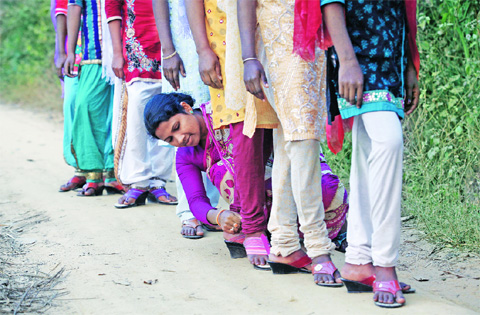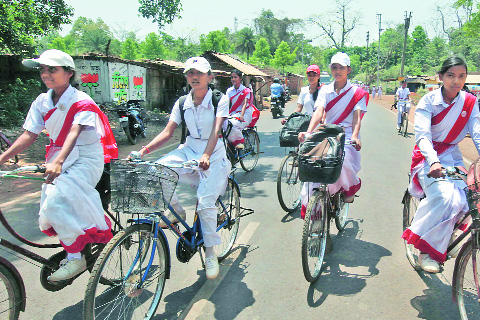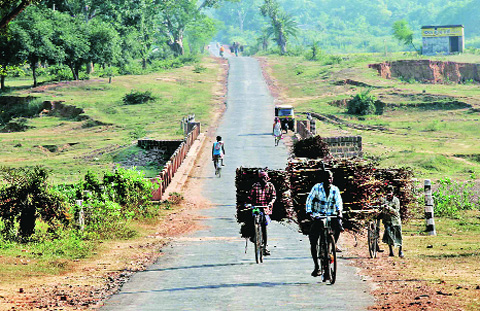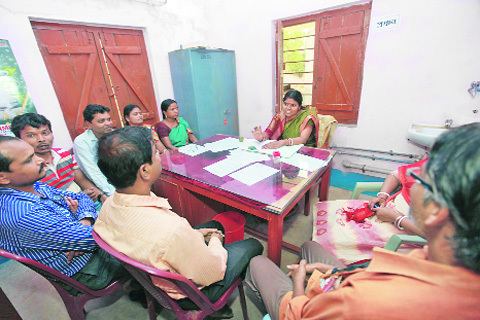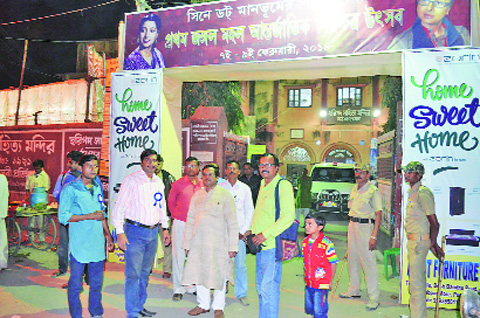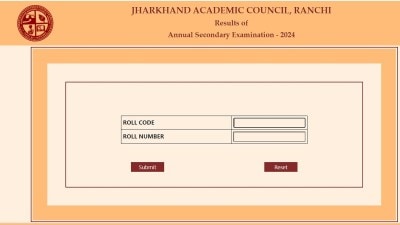- India
- International
Law in the Jungle
Mamata’s threat to quit if the West Midnapore SP was removed on the EC’s orders may have been just the kind of muscle-flexing the CM is known to indulge in.
Mamata’s threat to quit if the West Midnapore SP was removed on the EC’s orders may have been just the kind of muscle-flexing the CM is known to indulge in, but she was right in her claims about Junglemahal. Madhuparna Das finds a region and its women thriving in peace. Photographs: Subham Dutta
In characteristic style, Mamata Banerjee turned her recent confrontation with the Election Commission into a her versus the others debate, and about peace in Junglemahal versus “the region going up in flames again”. However, while her stand that the transfer of West Midnapore Superintendent of Police Bharati Ghosh, as ordered by the EC, would hurt peace in Junglemahal is contentious, few dispute that the region spread over 8,000 sq km area and three districts, which was once the worst affected by Maoist violence in the state, is one of the Trinamool Congress regime’s few success stories.
Not many saw it coming when Mamata rode to power in 2011, joining hands with several outfits with close links to the Maoists, particularly the People’s Committee Against Police Atrocities (PCAPA). During her campaign, she had denied the presence of Maoists in Junglemahal, and repeatedly sought the removal of Central paramilitary forces from there. In the initial days of Mamata’s government, actions against Maoists slowed down as she declared a ceasefire. However, as the threats by the Maoists against her party workers continued, that tenuous agreement came under strain and finally snapped.
A major turning point was the killing of Kishenji in November 2011. A month earlier, the TMC government had announced the start of a peace process and formed a committee to hold talks with senior Maoist leaders, including Kishenji. Though the government called his death the result of a “well-planned encounter”, Maoists said that Kishenji was called for a dialogue and killed. Kishenji’s death paved the way for Mamata to reclaim Junglemahal.

With a combination of political efforts and strong administrative action, including not coming to the rescue of jailed PCAPA leader Chhatradhar Mahato, Mamata would manage to bring Maoists and their supporters into the mainstream and restore peace. In the last two years, the police have not recorded a single instance of murder and abduction by Maoists in Junglemahal. In 2011, 26 civilians had been killed by Maoist violence in the area. On the other hand, 43 senior Maoist leaders have surrendered in the last three years while several senior leaders have been arrested. In the Amlashol village school, one of Junglemahal’s remotest, that has classes till VIII, student strength was up to 78 in 2013, from 13 earlier.
An area where in 2009 a Maoist threat ensured that people didn’t venture out to vote is now visibly enthused about the elections. Won by the CPM 10 consecutive times, including in 2009, the Jhargram seat has tribal Uma Soren in the fray on a TMC ticket. The party has fielded three star-turned-politicians, Sandhya Roy, Dev Adhikari and Moon Moon Sen, from three other constituencies. Polling in all of Junglemahal’s six constituencies — Bankura, Bishnupur, Purulia, Jhargram, Midnapore and Ghatal — is on May 7. All six were won by the Left in 2009.
Nowhere is the change more evident than in the growing participation of Junglemahal women in the region’s public spheres — as part of a conscious exercise by Mamata.
Ilabati Mahato can still remember the last three months of 2010 when her densely forested village Sapdhara in Jhargram district — considered one of the most Naxal-affected panchayat areas of West Bengal — saw 17 murders by Maoists. One of them was of schoolteacher Dibakar Hansda, who was killed in front of his students — a case that drew national headlines. Ilaboti remembers that women like her wouldn’t dare venture out of their mud homes in those years.
In 2013, the Trinamool approached her husband to ask her to contest for the post of pradhan of the Sapdhara gram panchayat. The same year, at least 30 Maoist cadres became TMC candidates and won in the panchayat elections. Junglemahal voted in large numbers and through the night in those polls.
Having studied up to Class X, Ilabati, a housewife, was adequately qualified. “But I was in a dilemma and nervous,” she recalls.
Not only did she win, but five of the nine members of the panchayat are now women. The Sapdhara panchayat is among the 1,000 in the state that recently received a grant from the World Bank for “exemplary work in project implementation”, says a proud Ilabati.
Ilabati, who had never been associated with a political party till the 2013 polls, still finds it hard to believe the change in her fortunes. “In 2010-11, everyday we would see a bullet-ridden body on the Sapdhara-Jamboni link road. At night, they would come to our villages with sophisticated weapons and order us to give them food and shelter. Security forces too would hold the maximum raids in our area. Six men from our village abducted in 2011 are still missing,” she says.
Lakshmirani Mandi’s “achievement” is minor in comparison, but for the 18-year-old, no less remarkable. The daughter of a landless agricultural labourer from Tentultala village — located in a remote corner of West Midnapore — was for four years an active member of the PCAPA, a frontal organisation of Maoists. She joined in 2010 soon after her brother Gopinath Mandi was dragged out of their home, charged under sections dealing with sedition and criminal conspiracy and branded a Maoist.
As part of the PCAPA, Lakshmirani was arrested several times for blocking roads and gheraoing police camps.
Earlier this year, Lakshmirani returned home. In January, she was among a dozen teenage girls from Junglemahal chosen and trained for a fashion show in Kolkata. Announcements regarding the beauty pageant were made in all the villages of Dahijuri. “All our friends queued up when a madam with her team came to take auditions in nearby Barro Jhuriamurrah village. Nine of us were selected from Junglemahal. For the first time, I went out of Jhargram. For the first time, I boarded a train. We were put up at the Netaji Indoor Stadium in Kolkata and stayed a week there,” she recalls, giggling.
Now Lakshmirani has gone back to school. “I will perhaps never become a model, but now I want to do something. Maoist terror and repression no longer exist. Police do not visit our villages as they used to. Maoist squads too do not hold meetings at night for which they used to gather villagers at gunpoint. We want to live. I want to study and I want to be a teacher,” Lakshmirani says, smiling.
Like Lakshmirani, Sakolmoni Hansda, a student of Class IX, is enthusiastic about school. Everyday she travels at least 8 km to Dahijuri High School from village Gosainbandh. “Earlier, I used to walk. But now I have a cycle that the government gave last year,” says Sakolmoni. At 13, Sakolmoni was among the youngest participants at the fashion show.
Mamata’s decision to make all tribal families BPL to enable them to get rice at Rs 2 per kg has also made a big difference. Sakolmoni doesn’t remember ever having two full meals a day before that.
While Maoists held sway in Junglemahal during the CPM’s time — with the Left doing nothing to make a dent in their support base among the tribals — Mamata made the first crack in that bastion by making some Maoists join her party. TMC Salboni MLA Srikanta Mahato and its Gopiballavpur MLA, Churamoni Hansda, are both former Maoist cadres. “During the Left rule, youths of Junglemahal were forced to join Maoists to fight the repression and torture of the CPM. But Didi has changed everything and now these youths want to join mainstream politics. So we are giving them a chance,” says Srikanta Mahato.
TMC MP and Mamata’s pointman in Junglemahal, Subhendu Adhikary, says, “Didi has established a link between the tribal population in Junglemahal and the administration and politics here. If you cannot involve people in the system, you cannot win their trust. Didi has involved them. We could make cadres come back to mainstream politics. To increase women participation in the three-tier system, Didi told us to get more and more women panchayat candidates here.”
Deepak Sarkar, CPM district secretary of West Midnapore, doesn’t have a convincing explanation for why Mamata succeeded where the Left didn’t. “Maoist cadres joining the TMC proves that the TMC had joined hands with them when the Left government was trying to fight the Maoists politically. Now the same political party is against the Maoists. But by joining hands with them earlier, the ruling party has been able to track the network of Maoists,” Sarkar argues.
Another TMC scheme that made a difference is recruitment of 10,000 special police constables from tribal villages. Apart from providing job opportunities in a region with few avenues, it helped the administration build a vast intelligence network at the grassroots level, keeping them abreast of any presence or advent of Maoists. There are four-five constables in every affected village in Junglemahal. The network is believed to have been instrumental in the recent arrests of Maoist leaders.
After Kishenji’s death, the state government speeded up the recruitment of constables and home guards, to ensure that Maoists who were trying to boost their numbers didn’t poach Junglemahal youth. Not only tribal men but 13,000 tribal women from the three districts of West Midnapore, Bankura and Purulia submitted applications for the post of junior constables in January 2012. According to official records, in 28 police stations across these districts, 93,285 tribal men and women applied for the post of special police constable. District administration records show almost 8,000 constables have been appointed from the tribal villages.
To keep youths away from Maoists, the government also promoted sporting activities. It announced a Junglemahal Cup, an annual football tournament in which 22 teams of tribal girls participated in the first year. Malati Mandi, who is now in Class VII, is part of the team in Jamboni, where Kishenji was killed in an encounter. “I started playing when I was in Class V. The local clubs selected us after physical tests. I remember two years ago, my parents used to send me to my maternal uncle’s house at Midnapore town as our village was not safe. My father and brother were forced to join the meetings held by Maoists. But now my brother is a constable and he is posted at the Jamboni police station,” says Malati.
“Now every block in Junglemahal has at least a couple of girl football teams,” says Durgesh Malladev, TMC president of the Jhargram subdivision.
In November 2012, in a rare praise, Union Minister Jairam Ramesh commended Mamata’s “political courage” for the work done in Junglemahal, and called it “the right approach” to deal with the Naxal problem. “She may not be our ally now but I must say that she has transformed the scenario in Junglemahal. She has shown the political courage required for changes in Naxal-affected areas,” he said.
According to sources, the reason Mamata objected to Bharati Ghosh’s transfer as West Midnapore SP by the EC last week was because of the rapport she enjoys with the officer. Junglemahal is a showpiece of the Mamata regime and she has taken care to ensure that she has officers here who meet her requirements, apart from making several visits there personally to announce schemes.
Ghosh joined the post in August 2013, much after peace had already returned to Junglemahal.
“Ghosh has always been seen as an official on very good terms with the ruling party. She made several Maoist cadres come back to mainstream politics and join the ruling party. During her tenure, a dozen cadres became panchayat candidates. Political activities in the Maoist stronghold villages increased too,” says a senior police officer of the district.
Purnima Mandi is a pradhan of the Barojhoriamurrah gram panchayat. Her husband is a teacher. “A couple of years ago, we could never think of coming out of our houses. Men and young boys used to stay out due to police raids as security forces would pick every youth they saw, and we would stay inside with our children and elderly members,” the 28-year-old says. “The TMC leaders convinced me that Didi wants women participation in the area to strengthen the peace process in Junglemahal. And now, I am the panchayat pradhan.”
The TMC’s candidate for the Jhargram parliamentary seat, Uma Soren, is a 30-year-old tribal doctor. She is pursuing her MD degree.
There are other signs of change. Like the beauty parlour run by a woman entrepreneur at Belpahari, a Maoist hotbed that was once Kishenji’s favourite shelter. “Many tribal women are lining up to have their eyebrows shaped or to get a facial. They all want to look beautiful,” says Mala Adhikari, the owner. The state government has been facilitating beautician courses for women. “We conducted a programme in which 30 tribal women were trained. A group of beauticians came and trained them. Now, they can start their own beauty parlours in their homes,” says Sarboday Saha, Block Development Officer, Binpur II, adding that they have found a high demand for such courses.
According to Sukumar Hansda, Minister for Development of Western Region, “Bringing women to the mainstream is an indicator of normalcy in the region. Didi always told us to get more and more tribal women into politics and other professional fields. According to Didi, if women start resisting Maoists in their villages, it would be tougher for them to recapture the area and regroup,” says Hansda.
However, the fear that the Maoists may make a comeback remains. Uma Soren campaigns with a platoon of at least 30 security guards armed with weapons. In the last one and a half years, no senior Maoist leader has surrendered or been arrested, while some of the dreaded leaders like Akash and Bikash àre still at large.
With reports from some villages of Maoist squads issuing calls to boycott polls, Mamata asked people in her públic meeting a couple of days ago to lodge FIRs if threatened.
Not that she would be unduly worried. The TMC is set for big gains in Junglemahal’s six.
Apr 19: Latest News
- 01
- 02
- 03
- 04
- 05


